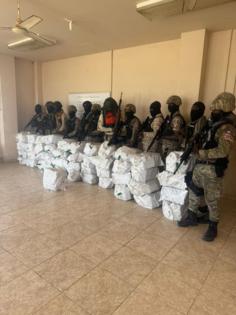Haiti police kill suspected Jamaican traffickers during historic cocaine bust
Published in News & Features
Three Jamaicans are dead and a Bahamian national is in custody in Haiti after a historic drug bust Sunday off the country’s northwest coast led to the seizure of more than 1,000 kilos of cocaine worth tens of millions of dollars in the United States.
Haitian authorities said the men were killed during a joint police operation that triggered a firefight on the high seas.
“There were two people who died at sea in an exchange of gunfire, and there was another who did not die on the spot but died later,” Jeir Pierre, the government prosecutor for Port-de-Paix, confirmed to the Miami Herald. Pierre said the three dead were Jamaicans, while a fourth suspected drug trafficker who was shot and transferred to a hospital is a native of The Bahamas.
Pierre did not have the names of the suspects but Haitian police identified one of the deceased as Jimmy Antony. The incident unfolded near the island of ‘île de la Tortue on Haiti’s northwest after police spotted two boats in Haitian waters.
While one of the boats managed to escape, a blue-and-white boat with three engines was intercepted. It had 40 packages of powder that tested positive for cocaine. Police said the boat carried 1,045 kilos of the drug, which has a street value of $32 million in the U.S.
The drugs are believed to have been destined for the Dominican Republic, a popular transit route for cocaine bound for the U.S. and Europe.
The seizure is a major victory for Haitian authorities, who last saw a haul of that magnitude in 2015, when the Panamanian-flagged MV Manzanares, dubbed the “sugar boat,” transported between 700 to 800 kilos of cocaine and 300 kilos of heroin, with an estimated U.S. street value of $100 million, into Port-au-Prince.
The seizure, which later became part of a U.S. Drug Enforcement Administration whistle-blower complaint, was bungled by DEA officials. Before that, the last major drug bust was in in the Port-de-Paix region, when police seized 400 kilos of cocaine.
At the time, Haiti’s northwest region was notoriously known as a transshipment route for smuggling people as well as drugs. In recent years, it has regained its reputation as a jumping off point for desperate migrants trying to make it to Florida’s shores.
Sunday’s seizure underscores what United Nations experts have been warning: As Haiti’s criminal groups take near-total control of Port-au-Prince and rapidly expand into other regions, the deteriorating security landscape poses a serious threats for the rest of the Caribbean and Latin America.
The U.N. Office on Drugs and Crime, which has been investigating the connection between Haiti’s armed gangs and migrant-trafficking routes being used by gangs to smuggle marijuana and possibly weapons to other countries. In one incident, they highlighted how a string of migrant landings over four days in the Turks and Caicos Islands led to the seizure of more than $2 million in marijuana. Grown in Jamaica, the drugs made it to the British dependent territory in boats that left Haiti with undocumented migrants.
In a report released this month, the U.N. agency detailed several other trafficking incidents that had effects beyond Haiti. They include a major drug seizure by Dominican law enforcement agents in May of more than 2.6 metric tons of marijuana and 11 kilos of suspected cocaine near the southern border of Haiti.
“Ongoing investigations suggest that the shipment was part of a wider transnational drug trafficking operation exploiting maritime and land routes connecting the Caribbean and Hispaniola,” the report said.
A week later in the Nippes region, also located in the south, Haitian police and agents with the anti-drug trafficking unit, arrested two people suspected of trafficking 44 kilos of marijuana in Saint Michel du Sud.
The report also highlighted a recent high-profile arms trafficking incident involving smugglers operating across the Dominican Republic, Haiti and the U.S. to emphasize the transnational nature of weapons and ammunition flows. The so-called “Mirebalais case” revealed how a firearms trafficking supply chain can depend on multiple people across several jurisdictions, as well as the dramatic aftermath, the U.N. said.
After the shipment was intercepted by Dominican customs during a routine X-ray inspection, the owner of the hotel in Belladère was arrested in Hinche, a city in Haiti’s Central Plateau that is currently under gang threat. Two days later, Haitian police apprehended two suspected weapons purchasers at the international airport in Cap-Haïtien as they attempted to flee to Miami. Two other individuals suspected of being involved in the case were also later arrested.
The Mirebalais prison, where suspects were being detained, was later attacked by heavily armed men affiliated with the Viv Ansanm organized crime coalition.
“The incident reflects international impacts of weapons trafficking but also the strategic expansion of gang operations beyond Port-au-Prince and the direct targeting of State institutions,” the U.N. report said.
Police sources have told the Herald that while gangs are involved in gun-running, they are also involved in drug trafficking. But it is unclear how deep the ties run between drug traffickers and gangs.
Despite the trends and growing concerns about gangs’ collaboration with South American and Mexican drug cartels, the country’s ability to investigate is weak. The DEA last year listed its Haiti field office among 14 foreign operations targeted for closure, along with offices in The Bahamas and Nicaragua.
A DEA spokesperson told the Herald at the time that the decision to close the offices was made following “a thorough review” of foreign operations. There is still no DEA presence in Haiti.
©2025 Miami Herald. Visit at miamiherald.com. Distributed by Tribune Content Agency, LLC.







Comments